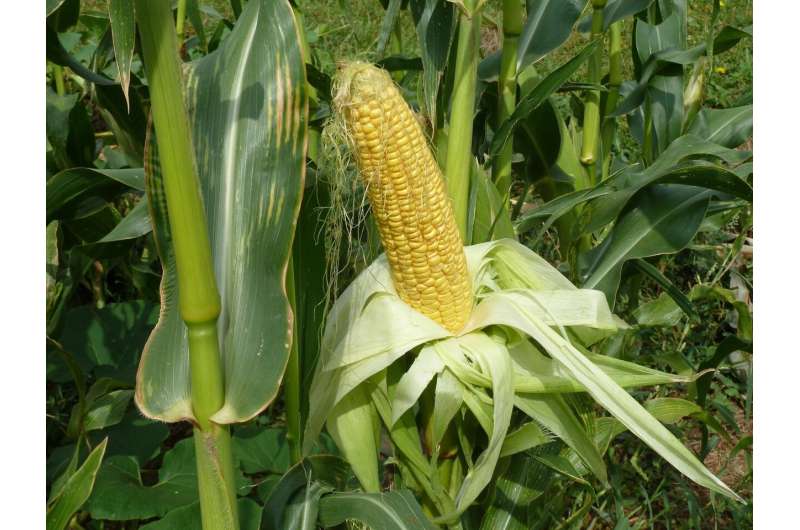Corn genetic heritage the strongest driver of chemical defenses against munching bugs

Plants release chemical distress signals when under attack from chewing insects. These "911 calls," as entomologist Esther Ngumbi refers to them, alert other bugs that dinner or a nice place to lay their eggs is available nearby. If predatory or parasitic insects detect the right signal, they swoop in like saviors to make a meal out of—or lay their eggs in—the bodies of the herbivore insects.
A new study explores the factors that contribute to corn plants' chemical signaling capacity, comparing how different corn varieties respond to herbivory in the presence or absence of a soil bacterium known to promote plant health.
Ngumbi, a professor of entomology at the University of Illinois Urbana-Champaign, led the research with U. of I. natural resources and environmental sciences professor Angela Kent and Ph.D. candidate Sierra Raglin, who is the first author of the paper. The findings are reported in the journal Frontiers in Microbiology.
Research into plant-microbial interactions is a growing area of interest to farmers hoping to maximize crop productivity and resilience, Kent said.
"The plant microbiome holds great promise for improving the sustainability of crop production," she said. "Our research is aimed toward treating the microbiome and its sustainability functions as a plant trait."
"The bacterium we tested, Bacillus altitudinus, has numerous plant growth-promoting characteristics," Raglin said. "It also is known to help plants tolerate stresses such as drought or heavy metals in the soil."
This and other soil microbes have been found to influence gene expression in plant tissues and boost immune responses, she said. "We wanted to see if this microbe also influenced plants' release of volatile compounds."
The researchers grew six varieties of corn in live or sterile soil in a greenhouse experiment. Some of the corn seeds were inoculated with the bacillus before planting. After four weeks, the scientists subjected the corn plants to corn earworm larvae, allowing the caterpillars to feed for 24 hours before collecting and analyzing the volatile compounds the plants produced.
The analysis revealed that the six corn varieties the team tested responded differently to munching bugs. Some varieties produced more or a greater diversity of volatile compounds than others. The presence or absence of the bacterium appeared to make little difference to those responses.
Only one type of maize seemed to respond to the soil microbe by increasing its overall production of volatile compounds. More research is needed to determine whether this enhances its defenses, the researchers said.
The soil bacterium did have one other effect: It promoted plant growth when the corn was grown in sterile conditions, the team found. But this condition would not be relevant to field-grown corn, the researchers said.
The findings are preliminary, and more work must be done to tease out the complex relationships, Raglin said.
"Even in an agricultural setting, the environment is complex," she said. The soil bacterium the team tested is only one of an interconnected web of microbes, and many other conditions can influence how plants respond.
"We don't want to overstate the role that any one factor contributes," Ngumbi said. "Every contributor to this interaction—the plant, the microbes, the soil—has a part to play. Care must be taken to ensure that you understand the contribution of every partner."
More information: Sierra S. Raglin et al, Herbivory Protection via Volatile Organic Compounds Is Influenced by Maize Genotype, Not Bacillus altitudinis-Enriched Bacterial Communities, Frontiers in Microbiology (2022).
Journal information: Frontiers in Microbiology
Provided by University of Illinois at Urbana-Champaign




















